Scoring for gender equality through sport
Date:
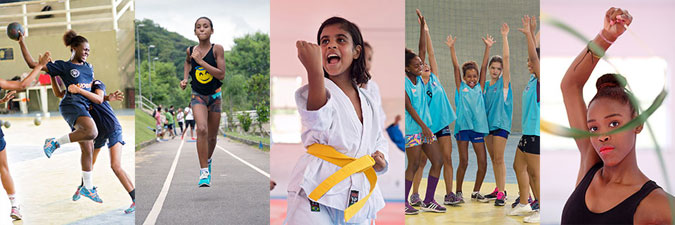
Photo: UN Women
The issue
Women are more visible in sport now than ever before: Of a total of 997 athletes, only 22 women competed, for the first time, at the 1900 Games in Paris. The London 2012 Olympics was the first Games in which women competed in every sport of the Olympic programme. In Rio, approximately 4,700 women—45 per cent of all athletes—will represent their countries in 306 events.
As many industries have increasingly recognized, women widen perspectives, bring in new ideas and innovations, and reach new audiences. However, there is still a long way to go before we will see full equality in the world of sport. Girls and women across the world get fewer opportunities, less investment, training and safety when they play sport. When they make it as professional athletes, they meet the glass ceiling and a substantial pay gap. The total payout for the last Women’s Soccer World Cup, for example, was $15 million, compared to $576 million for the last Men’s Soccer World Cup. Off the field, women are underrepresented in the leadership of sporting organizations, in sport clothing companies and marketers. As of July 2016, 22 women are active International Olympic Committee (IOC) members (24.4 per cent) and four women (25 per cent) are members of the Executive Board.
The 2030 Agenda for Sustainable Development adopted by world leaders in 2015 has set the roadmap to achieve gender equality by 2030. The Agenda explicitly recognizes sport as an important enabler for development and women’s empowerment.
In the lead up to the 2016 Rio Olympic Games, hosted in Brazil from 5 to 21 August, we spotlight the remarkable achievements, persistent hurdles and unmatched potential of women and girls in sport.
Quiz
UN Women at 2016 Rio Games
“We are carrying the torch for women and girls all over the world”
In a speech at the “One Win Leads to Another” event during the 2016 Rio Olympic Games, UN Women Executive Director Phumzile Mlambo-Ngcuka highlighted the importance of giving adolescent girls the opportunity to learn from and be empowered through sport. Read more»
UN Women and the International Olympic Committee (IOC) have been partners since 2012. At the 2016 Rio Games, they will present ‘One Win Leads to Another’, an innovative joint programme to empower young women and girls through sport, at an event on 6 August. The programme builds the leadership skills of adolescent girls through quality sport training, creates safe spaces for girls and gives them tools and knowledge to break social barriers and access services if experiencing violence. It also equips the participants with basic economic skills. The programme is being piloted, with additional support from the Swedish Postcode Lottery Sport Foundation and in partnership with Women Win, in the Olympic Villas located in disadvantaged areas of Rio de Janeiro.
UN Women Executive Director Phumzile Mlambo-Ngcuka has been invited to carry the Olympic Torch in Rio, and nominated to be part of a prestigious jury to award a prize during the Opening Ceremony of the Olympic Games. Thaiza Vitória da Silva, 15, and Adrielle Alexandre, 12, participants of the ‘One Win Leads to Another’ programme, will also carry the Olympic Torch.
A snapshot of our efforts
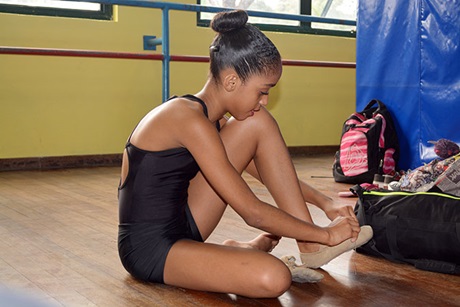
In Brazil, girls build self-esteem and independence through sport
What does being a winner mean? For 12-year-old Adrielle Alexandre, who will carry the Olympic torch, it’s not only about becoming an Olympic rhythmic gymnast, but making her community a place free of violence and full of respect. She is among 400 girls who are participating in a programme in Brazil that empowers girls through sport and by creating safe spaces.
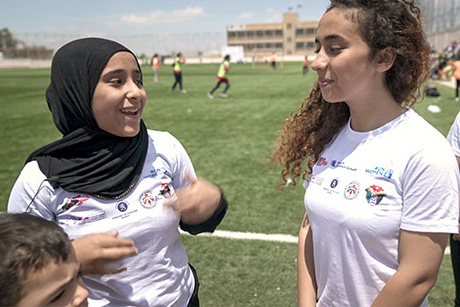
Football camps in Jordan plant seeds of friendship and cohesion
For Syrian refugees in Jordan, integration into the Jordanian society is fraught with challenges. Mistrust and rumors taint how each group perceives the other. A project by UN Women organized football camps for adolescent girls, where Jordanian and Syrian girls built friendships and social cohesion.
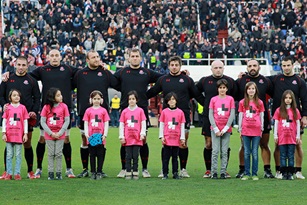
Rugby players in Georgia scrum against violence
From starring in billboards and videos to meetings with men and boys across the country, Georgian rugby players are leading advocacy to end violence against women. Public perception is changing, survivors are seeking support, and men and boys are taking a stand against violence.
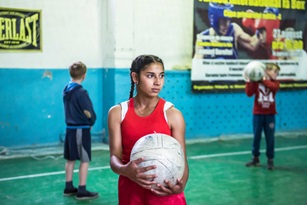
Stela Savin, challenging gender stereotypes in Moldova
“I am honouring our Roma traditions. I am never going to abandon them. However, I don’t want to leave school and training and get married…I don’t know why girls think they can’t do the same as boys do?” Stela Savin comes from a Roma family and attends eighth grade in Moldova. Her dream is to become a world boxing champion.
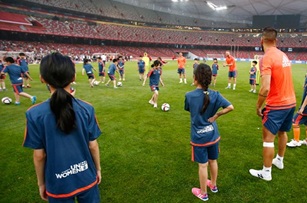
Playing for gender equality with Valencia Club de Fútbol
Valencia Club de Fútbol, the first sport club to become a UN Women global partner, is hosting special matches and soccer clinics around the world to advocate for gender equality and women’s empowerment.
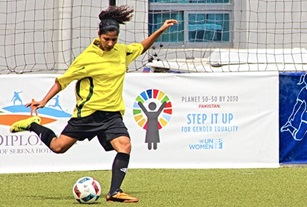
Beating gender stereotypes in Pakistan with football
Hajra Khan made history when she became the first Pakistani female footballer to sign a contract to play abroad in the Maldives National Women’s League in 2014. In a society where gender stereotypes and cultural barriers prevent girls from participating in football, this is not a small win.
Samoa’s Rugby team goes orange as players UNiTE to end violence against women
Manu Samoa, the national rugby team intensifies efforts to raise awareness about violence against women in the Pacific region, dedicates the 25 June test match between Samoa and Tonga to the UNiTE Campaign.
For the Federation, every day is Orange Day: Q&A with Stephan Fox
Stephan Fox, the Vice President of the World Muaythai Council and the General Secretary of the International Federation of Muaythai Amateur, has been working with UN Women since 2014 to promote gender equality and raise awareness on ending violence against women.
Photo essays
A day in the life of Thaiza Vitória da Silva, Rio de Janeiro
Thaiza Vitória da Silva is a 15-year-old handball player from Anchieta, a neighbourhood in northern Rio de Janeiro, Brazil who will be representing the 400 girls currently participating in the 'One Win Leads to Another' programme during the Torch Relay for the 2016 Rio Olympic Games.
For adolescent girls in Brazil, ‘One Win Leads to Another’
Using sport as a tool to reduce gender inequalities and develop self-esteem and life skills among adolescent girls, ‘One Win Leads to Another’ aims to reach 2,500 girls by early 2017 and is now active in almost 20 Olympic Villas in Rio de Janeiro.
Videos
"One Win Leads to Another" - empowering young women and girls through sport in Brazil
"One Win Leads to Another" is a joint programme by UN Women and the International Olympic Committee (IOC) to empower young women and girls through sport in Brazil. As part of the Olympic legacy, UN Women builds the leadership skills of adolescent girls through quality sport programmes, improving their ability to influence decisions that impact their lives at all levels. The project creates safe spaces for girls to break social barriers and equips them with basic economic skills, increased knowledge of their bodies and the confidence to access services in the event of violence.
Girls kick violence and HIV with Grassroot Soccer
Grassroot Soccer, a grantee of the United Nations Trust Fund to End Violence against Women, uses the power of football to educate, inspire and empower young people to stop the spread of HIV and AIDS and to prevent violence against women and girls. In 2009, it developed the innovative “SKILLZ Street” programme to specifically focus on young girls and address the unique needs of adolescent girls, who are at a higher risk than their male peers. Through 2014 and 2015, almost 3,000 adolescent girls aged 10-14 years graduated from the SKILLZ Street programme in South Africa, including in Soweto, Alexandra and Khayelitsha. With the support of the UN Trust Fund, the organization plans to reach an additional 5,600 adolescent girls in five South African sub-districts by the end of 2016. Learn more »
Football helps integrate Syrian refugees in Jordan
Football camps in Jordan are helping ease tensions between local communities and thousands of newly-arrived Syrian refugees. The camps create a space where young Syrian and Jordanian girls interact, compete, and create life-long friendships.
The football camps are a joint initiative by the Ministry of Education, Asian Football Development Project and the Jordanian Football Association, with support from UN Women.
‘One Win Leads to Another’ – Girls in Rio celebrate launch of Olympic medals with IOC President
Girls participating in the joint programme of UN Women and the International Olympic Committee (IOC) to empower young women and girls through sport were the IOC President’s special guests at the Launch of Medals and Victory Ceremonies of the 2016 Olympic and Paralympic Games in Rio de Janeiro, Brazil.
As part of the IOC’s legacy project, UN Women builds the leadership skills of adolescent girls through quality sports programmes, improving their ability to influence decisions that impact their lives at all levels. The project creates safe spaces for girls to break social barriers and equips them with basic economic skills, increased knowledge of their bodies, and the confidence to access services in the event of violence. Learn more »


